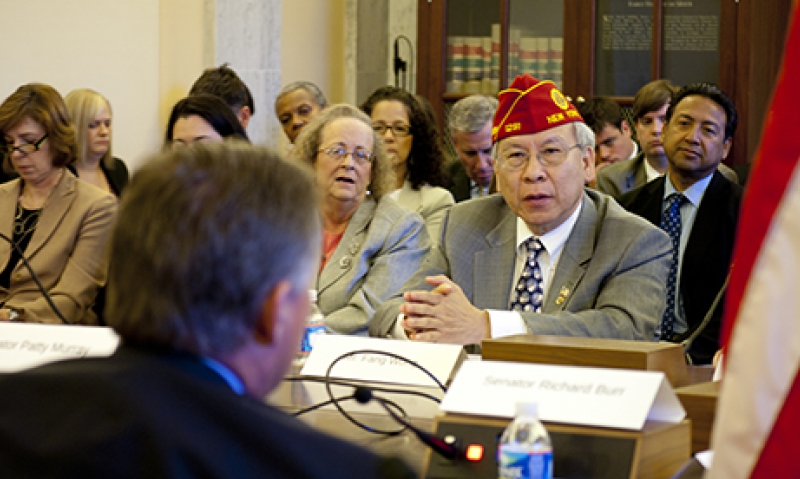
During veterans employment roundtable hosted by chairman of the Senate Veterans' Affairs Committee, Wong expresses need for change to Transition Assistance Program.
On the last day of his extended visit to Capitol Hill, American Legion National Commander Fang A. Wong earned nods of approval and messages of congratulations as he offered solutions to help end the current employment crisis among military veterans. He made his remarks in an Oct. 6 veterans employment coundtable hosted by Sen. Patty Murray, chairman of the Senate Veterans' Affairs Committee (SVAC).
The roundtable talk was on familiar topics: chiefly, that there's a disconnect between the military and civilian communities, and that military-speak is lost in translation to civilian human resources professionals.
In his nine-minute presentation to Murray, SVAC Ranking Member Sen. Richard Burr and the other roundtable participants, Wong discounted the notion that the civilian workplace is necessarily hostile to veterans. "We hear that private industry - big business - is not willing to hire veterans," Wong said. "But, give them the benefit of the doubt."
Wong said that the human resources specialists who screen job applications, through no fault of their own, can be handicapped by a lack of the information they are directed to seek on a job application. "Sometimes (the HR specialists) are looking for a special ‘key word' or a certain certification, and if it's not there, the HR specialist will not even process that application," Wong said. "Therefore, the manager who would do the interview will never even see the applicant."
Wong and Murray agreed that education of HR professionals about translating military experience into civilian terms or, conversely, the military training transitioning servicemembers how to translate their military training and experience records into civilian language - or both - is needed. Wong suggested that large corporations might launch this initiative, at least on the civilian side. This was an obvious reference to Microsoft Corporation, whose general counsel, Brad Smith, participated in the talk. Smith, an American Legion Boys State alumnus, told of progress in his company's "Elevate America" program, begun in August, which offers cash, software and training to help veterans complete IT training. During his presentation, Wong made frequent reference to the Department of Defense's Transition Assistance Program (TAP), in which servicemembers leaving the military are given training on re-adaptation to civilian life. TAP includes some job counseling.
"It's being given too late," Wong said. "By the time they receive training, they're out of the door. If it were given earlier - six months prior - they would have time to digest (the information) and learn a little bit more, then come back just before they get out of the door. (Then) they could ask more questions and get more help. "
In remarks both during and after the roundtable session, Wong pointed to other factors that he feels adversely affect the TAP process. "Career servicemembers who have been in the military for a number of years are completely different than some young person who has been in the service for a short time. Their mindsets are completely different," he said. "A person who has been in the military for, say, 20 years might want more information about what specific opportunities are available to him or her in the civilian job market. They will already have many years of experience, whereas a young person might need more basic information about schools and whether he or she needs to pursue more education and how to present themselves to employers and how to write a résumé. So, maybe there should be different TAPS for career servicemembers and ones who are in for short terms."
Wong also suggested a more consistent delivery of the transition assistance program is needed. "It can vary from base to base," he said. "Sometimes the instructors are very enthusiastic and do a really good job of keeping (their students') attention, and some instructors are not so involved. I have also heard of times when it was decided that there weren't enough participants to warrant a TAP class and it was cancelled. TAP can be very useful, but not if it's given badly - or not at all."
- Legislative

